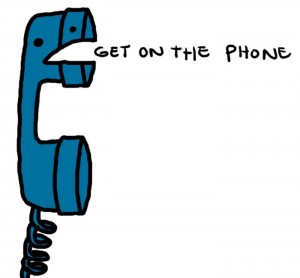
When I started in search in 1998, conventional wisdom said that if you were not on the phone, you were not working. In fact, two of the firms for whom I have worked had call tracking software built into the phone system. Every night, the head of the office would send out a report to the entire company detailing how many calls each recruiter made and how much time they spent on the phone. It was implied that recruiters who spent time sending e-mails and performing internet research did so because they lacked the spine to make cold calls. This attitude became deeply ingrained in me.
However, times change and technology changes behavior. Many people today are not likely to answer the phone if they do not recognize the number on the caller ID and even less likely if the caller ID is blocked. A few candidates in their twenties and thirties who work at big companies have confessed to me that they frequently go a week without checking voicemail. They feel that if information is important, it will arrive via e-mail.
To adjust to the changes in how people communicate, I have had to change the way I initiate contact. I could still make eighty cold calls in a day, but seventy of them will go right to voicemail and of the ten people who answer, most will not be interested in speaking. Instead, my first candidate contact is nearly exclusively via e-mail. I send a brief, personal e-mail that tells the candidate who I am and the nature of my search. I’ll then ask if they would like to speak.
I receive significantly more responses than I do with voicemails—some days one-third of the people I e-mail will respond. Now, a number of candidates will respond to say “no”, but many more will respond with follow-up questions or a request to set up a time to speak. In a good day, I’ll send out forty emails that will generate four or five e-mail conversations and eight or nine phone conversations. These phone conversations are usually far more productive than the old “catching them at their desk” conversations because the candidate has agreed in advance to discuss your search (or his career, or potential referrals) and is likely taking the call at a place and time where he or she is able to focus completely on the conversation. I’ve also received numerous e-mails from candidates interested in discussing a search who were made aware of the opportunity because friends or colleagues forwarded my original note to them (frequently without responding to me).
The advantages of making initial contact with e-mail instead of a phone call are many. You get a higher response rate because e-mail is silent—candidates need not worry about who can hear them speaking. You do not have to worry about gatekeepers deflecting your call or about reaching out to too many people in the same department in a short period of time. And candidates can respond when it is convenient—you’re not calling somebody who is battling a deadline.
Obviously, the real “work” still has to be done on the phone or in person. If you are presenting a job, interviewing a candidate, preparing for or debriefing after an interview or hopefully extending an offer and closing a placement, you still need real-time interaction. You need to listen to what a person says (and does not say), establish a personal connection and help him or her make a major life decision. That is not something I would recommend attempting via e-mail. However, I have found that by cutting out the inefficient process of leaving seventy voicemails in a day, I can drastically increase the amount of time I spend on productive tasks.
Given how I grew up in the business, this was not an easy transformation for me to make. It was only when I saw the success that other people in my office were having that I decided to give it a try. And based on my personal results, I think that the cold e-mail will eventually replace the cold call as the standard method of initial candidate contact. There is so much information available today that uncovering candidate identities and e-mail addresses is pretty easy. What will be interesting to see is what will happen to our profession once a major barrier for entry, the willingness and ability to make cold calls, is removed from an industry with an already-low barrier for entry.